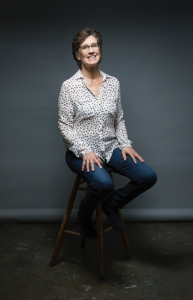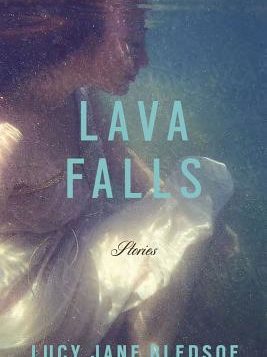 Lava Falls: Stories
Lava Falls: Stories
by Lucy Jane Bledsoe
Univ. of Wisconsin. 245 pages, $24.95
THE JOURNEY has long been a useful framework for storytelling. Just as Chaucer had 29 travelers exchange tales on a pilgrimage to Canterbury in the 14th century and Katherine Anne Porter put dozens of passengers on a boat to regale each other with stories in 1962’s Ship of Fools, a journey is the structure for several stories in Lucy Jane Bledsoe’s rich, lively collection, Lava Falls. The engrossing title novella goes further, unwinding a tale that reaches back hundreds of years while pointing to an uneasy future.
Bledsoe grew up in Portland, Oregon, and now lives with her partner Patricia Mullan in Berkeley Hills, California. A novelist and nonfiction writer, she has been awarded two National Science Foundation fellowships for writers, and her books have been translated into five languages. Exploration and discovery on a personal and global scale mark her work. Her recent novel A Thin Bright Line, for example, imagines the life of an aunt for whom Bledsoe was named, who had died in a fire when the author was nine. The author identifies with this aunt, whose studies of climate change in the Cold War era—along with her lesbianism—went largely unacknowledged.
Bledsoe’s settings can be extreme—places like Antarctica, where she has stayed at the three American stations, or the Alaskan wilds, where she has kayaked and hiked—but her writing is unpretentious, filled with everyday details and natural-sounding dialogue. In this collection and elsewhere, Bledsoe writes about the constrictions families often impose, how relationships ossify (or grow), and the difficult risk-taking that can be needed for survival. “The End of Jesus,” for example, describes a pastor’s surreptitious expulsion of a young lesbian from his church youth group in Armpit (!), Oregon. The narrator, who once knew the teen, recounts the story as a quest to figure out the truth of what had happened. At the same time, the narrator’s own rebellion is revealed when she skips her mother’s funeral in Portland and heads instead to Powell’s Books as an “antidote” to church rituals.

In “Skylark,” Bledsoe recounts the trials of an unloved high school senior who bolts from home in Little Rock, Arkansas, and boards a bus for Oakland, California. As she’s crossing the Rockies, the teen finds herself panicked by the scale of her getaway, yet suddenly confident of her musical ability. “No one was coming after her. That hurt so much,” she says. “It also meant she was free. Fly, girl. Fly and sing. She knew she could sing.”
Several stories deploy relocation as an opportunity for radical change. “Girl with Boat” tells of a forty-year-old woman’s return to the frame house along a remote tributary of the Yukon River in Alaska where she once lived, a place she and her brothers had dubbed “Father’s Eden.” Back when she was seventeen and overwhelmed by isolation, the narrator escaped, using an abandoned blue wooden kayak that her mother had recently hauled out of the waist-deep, numbingly cold creek. In hindsight, the storyteller appreciates the enormity of her mother’s effort. “I have often wondered how she survived that feat,” she says. “I like to think she risked her life for me.”
The notion of transformation by water journey is expanded in “Lava Falls,” a novella-length tale of eight people in three boats who venture on a two-week rafting trip along the Colorado River. Six women occupy two boats, while a man and his wife occupy the third. The rafting parties follow the river downstream from Marble Canyon in the northeast corner of Arizona, paddling roughly 200 miles to Diamond Creek, near the Nevada border. Bledsoe’s rendering of logistics is impeccable, as I discovered when tracing the route on a map. She expertly depicts the perils of negotiating river rapids, as well as the wrenching shifts in relationships that happen as the journey unfolds.
We learn each participant’s back-story, as well as hints of what moved her to sign on for the trip. Much disclosure happens through Bledsoe’s low-key yet fraught conversations. Millennials, Gen X’ers, Baby Boomers, and a member of the Silent Generation occupy the boats, each traveler disclosing worries they brought along, such as the death of a parent, doubts about a job or retirement, or a harsh romantic breakup. Josie, 41, is the indomitable river guide; Maeve, at 73, is a powerhouse of calm focus.
The geology professor and his wife, in the third boat, seem unremarkable. When their raft enters the churning Lava Falls chute, however, it capsizes—belying the geologist’s claimed experience. The boat is lost, the couple is saved, but the event marks the breakup of their marriage. Other changes are less tumultuous, but each “Lava Falls” venturer reaches a new place—in a relationship or in self-knowledge—before the trip is over.
The bulk of “Lava Falls” takes place in the 21st century, but its opening scene is set close to a thousand years ago. A youthful, pregnant woman walks down a narrow path from the Grand Canyon rim, storing seeds, pinyon nuts, grass rice, and agave in “granary” hollows on cliff walls as she goes, in preparation for moving on. Alas, the woman loses her footing and plunges to the river below, initiating the present-day story.
At several points in “Lava Falls,” people have visions. Near the end, Maeve spots the corpse of a young woman with swollen belly who has been dead for perhaps “hundreds of years,” floating in the water. A sense of foreboding fills the air. The next morning, when the rafters reach the rendezvous spot for a pre-arranged lift to the airport, their driver has failed to show up. On the second morning, formations of fighter jets appear, roaring overhead. Bledsoe’s conclusion is neither tidy nor reassuring, but she credibly portrays the human enterprise, plagued with relentless uncertainty while still seeking refuge in nature’s astonishing resilience. As a character in another Bledsoe story matter-of-factly observes: “As if there is such thing as a safe harbor.”
Rosemary Booth is a writer and photographer living in Cambridge, MA.






